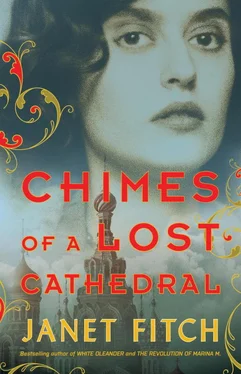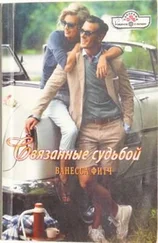The peasant next to me in the wagon sniffed the hot air. “Izhevsk. Can’t you smell it?”
I could—the rubbery stink of the factories, turning out Red rifles and bayonets that could point any which way. I only hoped they still remembered me there.
They did remember. At the soviet, they beamed at the baby, laved praise on the Red October and on Genya in particular. The bustling redheaded president of the local soviet personally oversaw the drawing up of my propusk to return to Petrograd. I warmed to the respect in the apparatchik’s yellow-brown eyes when he heard the magic word— Petrograd . Whereas, to the women of Praskovia’s village, it was the land of fairy-tale tsars and paved streets, at the Izhevsk City Soviet, Petrograd meant something quite different. It was the cradle of revolution. It was the Aurora, the storming of the Winter Palace. Though Iskra was crying and had pooped her diaper, the clerk still afforded me a full measure of Bolshevik approval.
Again I was brought to the munitions factory, where I met with their committee and gave an impromptu lecture on the further work of the Red October, and the situation in the villages—their bravery at bringing in a crop despite the absence of their men and so on—and was given an item that was more precious than rubies, a metal pail. Anything metal was highly prized, and with this pail, I might boil water, wash the baby’s clothes. I wanted to go straight to the train station, talk to the men and find out the situation on the rails, but one could not rush this kind of diplomacy. I ate with them in the factory canteen, and accepted a place for the night with the chairman of the committee, who spent the whole time talking about my husband, the Future of Russia, and read aloud to me at length from Genya’s second book of poems, Red Horses . Oh Great Rus.
It was only on the third day that I was able to conduct myself to the Izhevsk station and present myself to the stationmaster, accompanied by two members of the committee. The tension between the Bolsheviks and the railroadmen was alive and well, even here—I saw it in the way they enjoyed instructing the stationmaster on what he should do with me, their interference doing more harm than good. The stationmaster bristled from the hair in his ears to his gray moustache in the small office decorated with the familiar calendars, timetables, and portrait of Lenin. My escorts urged me to go south to Kazan, and meet the comrades there in another factory, then to Nizhny Novgorod, Yaroslavl… If it were up to them, I wouldn’t be home until New Year’s. And the train to Kazan was due to arrive soon, just a few minutes. What luck! I kept hoping they would leave me alone, but it looked like they were going to accompany me right onto the train.
“What about Vyatka?” I said. “The Vologda line?”
“The English are up there,” said the committee woman, in her skirt of rags and patches. “We heard they made it down as far as Velsk.”
I continued to speak directly to the stationmaster. “What do you think, Comrade? What’s the word up there? I’d like to take the fastest route, the fewest stops.” I didn’t want to say the fewest roadblocks and searches —he might think me a speculator, with a pood of flour hidden in my skirt.
He smoothed his moustache and then ruffled it up again. “The Vologda line’s faster. You might sit awhile in Vyatka, but up there you’d only have to worry about bandits. I wouldn’t worry about the English. ” He shot a contemptuous look at the committee woman.
“Our comrades in Nizhny could use a good speaker,” said the man from the committee in his worn leather cap. “An agitator from Petrograd? From the Red October ! The wife of Gennady Kuriakin? It would be a great honor.”
I nodded, pretending I was considering it, then sighed. “I have to get back. Orders.” Oh, how important I must be! “Another train’s being assembled. For the Denikin front.” Wherever that was these days. I hoisted the baby on my hip, as if it were the most natural thing in the world, to lug an infant around the agitprop circuit in the middle of a civil war. “What time’s Vyatka?”
I waited for the evening train north, nursed Iskra, and ate a little of the bread hidden in my skirt. I glanced up to discover a boy and a girl, no older than four or five, standing before me, dressed in ragged shirts and nothing else—no shoes, no trousers, their hair clotted with dirt and lice. They stood quietly, gazing not at me but at the baby at my breast. Saying nothing, not begging, just looking at her, tied to me in the flaxen cloth. The naked longing in their dirty, drawn faces was so far beyond hunger I couldn’t bear it. I offered them bread and one of our eggs. They snatched the food out of my hands and ran away to eat it like dogs. Mothers, Don’t Abandon Your Children! Where did they come from? Left behind while the families clambered onto trains? More likely orphaned. So many children everywhere in the Izhevsk station, begging, plying the crowd. People shooed them away like pigeons.
What would become of Russia? I really wondered. It had been uplifting to ride the Red October, yet every day we passed through stations like this, full of hungry, lost children, solemn, awestruck. Children, despite their terrifying, scavenging lives, crowding into our kino car, wanting to see something miraculous—a visit from a dragon or sorcerer in the midst of their unspeakable misery. A group of urchins threaded its way through the crowd, magpie eyes watching for any unattended package, any crust of bread they could snatch from a hand. What would become of them all? Starvation. Typhus. Surely some would live, and what then? Criminals, bandits, prostitutes—if they hadn’t already passed that milepost. Soldiers, if they lived long enough.
How dare I feel frightened about making this trip alone! I was privileged just to be an adult. To have an education, a story to tell, some wits about me. Even fatherless Iskra was enviable, my breast in her mouth.
Finally, toward the end of the long northern day, the Vyatka-bound train jarred and shivered into the station. Iskra wailed with the noise, metal on metal—didn’t they have grease anymore? A mixed train of twelve cars, both passenger and freight, of varying decades, it was already packed, people sprawling on the roofs, hanging out the windows as more tried to push on, but the blessed stationmaster put me on the train himself, shoehorning me into a tattered first-class compartment with curtains. My compartment-mates seemed resigned—some sort of intelligentsia by the looks of them, three men and a woman. They moved their belongings around to make room for one more. If they were looking for food, they were traveling the wrong way. There would be nothing to eat in the north but wood.
A journey that should have taken two hours took nearly ten, despite my calculations. The train kept stopping, shunted and searched. I got to know my fellow passengers rather well. They were German Marxists, old-fashioned Social Democrats coming from Ufa. My German was not as good as my English, but it wasn’t so bad, and one of the men spoke passable Russian, so we talked about the fate of the German revolution, and the imminent proletarian revolution in the West. The Russian speaker, a long-nosed man in steel eyeglasses and shapeless jacket named Blau, said that the German socialists Rosa Luxemburg and Karl Liebknecht had been executed back in January. The Spartacist revolt had been crushed. “Ebert called on the Freikorps to do the dirty work. That so-called socialist.” Ebert, the president of the Weimar Republic. But who were the Freikorps?
“Right-wing paramilitary,” he said.
Working for a Social Democrat?
Читать дальше












